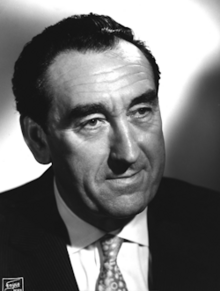Gottlob Frick

Gottlob Frick (28 July 1906 – 18 August 1994) was a German operatic
Life and career
Frick was born in Ölbronn, Württemberg on 28 July 1906, the youngest of thirteen children of a Swabian head forester and gamekeeper.[1][2] In the mid-1920s he attended the Stuttgart Conservatory, studying under Fritz Windgassen (father of Frick’s contemporary, the tenor Wolfgang Windgassen).[2] From 1927 he sang in the chorus of Stuttgart Opera and in 1930 he auditioned for Siegfried Wagner, director of the Bayreuth Festival, who engaged him for small parts.[1][3]
Frick's first major solo role was at the
In 1950 Frick moved to the
According to The Times, Frick, who had "one of those saturnine, dark voices that seem peculiar to the German-speaking countries", had:
In his A to Z of Singers, David Patmore quotes the conductor
Frick died in Pforzheim in Baden-Württemberg on 18 August 1994, aged 88.[1]
Recordings
According to Patmore, Frick's recorded legacy, of both commercial and live recordings, is substantial and does him full justice.
References
- ^ a b c d e f g "Obituary: Gottlob Frick", The Times, 14 September 1994, p. 17
- ^ a b c Forbes, Elizabeth. "Gottlob Frick", The Independent, 10 October 1994, p. 14
- ^ a b c d Patmore, David. "Gottlob Frick", from A to Z of Singers, Naxos Music Library.
- ^ a b c d Rosenthal, Harold, and Alan Blyth. "Gottlob Frick", Grove Music Online, Oxford University Press, 2001. (subscription required)
- ^ "Gottlob Frick", MetOpera Database. Retrieved 11 March 2024
- ^ a b Steane, John. "Gottlob Frick", The Guardian, 4 October 1994, p. 17
- ^ Steane, p. 331
- ^ Culshaw, pp. 181−182
Sources
- ISBN 978-0-436-11800-5.
- Patmore, David (2015). A to Z of Singers. Hong Kong: Naxos. ISBN 978-1-84379-072-3.
- ISBN 978-0-71-560661-2.
External links
- Discography of opera recordings (Capon's Lists of Opera Recordings)
- Gottlob Frick Gesellschaft
- On video, recording in studio as Hagen for Solti's famous Ring
- Singing Rossini (audio only)
